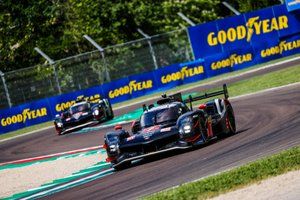WRC teams to be offered strategies for hybrid use in 2022
Hybrid systems are expected to be utilised on every stage of World Rally Championship events next year with several strategies on offer to teams, as more details of WRC's hybrid future emerge.

Photo by: Toyota
The WRC will usher in new Rally1 regulations next year which will see all-new faster cars constructed with a plug-in 100kW hybrid system and a much tougher safety cell to protect the driver and co-driver.
Introducing hybrid to the WRC has been a key part in ensuring Toyota, Hyundai and Ford, through M-Sport, will remain in the series for the next three years. All three outfits have been testing their new cars, complete with the Compact Dynamics-designed hybrid system, in recent weeks.
Teams have been given outlines as to how the system will be used next year, although the full details are yet to be confirmed.
Now FIA Rally Director Yves Matton has shed some more light on the use of hybrid, confirming to Autosport that it will be used on road sections and on every stage in bursts.
Drivers won't be able to deploy the extra power through a button, as previously seen in Formula 1, but teams will be offered a number of strategies for using the extra power during each stage through software programmes.
"We have the main principles. Mainly it will be used on some road sections in full electric mode," Matton told Autosport.
"It will be used at the start of the stage, also where you will have both hybrid and the internal combustion engine giving you full power, and then under conditions it will be used in the stage to bring in some performance to the car following different programmes that you will be able to fine-tune.

Hyundai hybrid Rally1
Photo by: Hyundai Motorsport
"You will not have a button to use the power, it will be more a software and under conditions you will have the power.
"You will have a number of different strategies that you will be able to choose but the driver will not be able to set up the strategies by themselves. The system we are working on is for all the stages."
Matton has been encouraged by the feedback from the Rally1 car tests undertaken by the teams and is confident that despite some induced delays resulting from the COVID-19 pandemic, WRC's new era will kick off on time at the Monte-Carlo Rally in January 2022.
"It is going quite well - all the manufacturers have been able to test their new cars in proper conditions, mainly on rough gravel, because they want to test the car in the worst conditions to see what is wrong," Matton added.
"The feedback we have had back is positive from the drivers and the teams. There is still a lot to do for sure, but we have several months until now and the first event in Monte Carlo to be ready.
"It is very interesting to start this new era with Rally1 car, which will be faster with this hybrid system, but also a completely new safety cell.
"We are a bit late, but what we see now with the positive tests we will be able to commit to the new cars in Monte Carlo and ready to start in 2022."
Be part of the Autosport community
Join the conversationShare Or Save This Story
Related video
Subscribe and access Autosport.com with your ad-blocker.
From Formula 1 to MotoGP we report straight from the paddock because we love our sport, just like you. In order to keep delivering our expert journalism, our website uses advertising. Still, we want to give you the opportunity to enjoy an ad-free and tracker-free website and to continue using your adblocker.















Top Comments